
Bourse du Travail
Encyclopedia
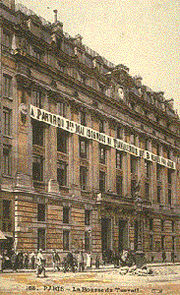
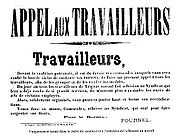
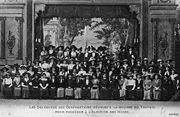
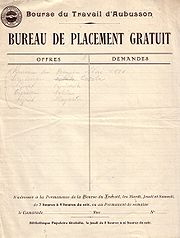
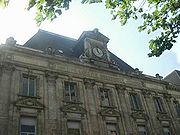
Labour council
A labour council, trades council or industrial council is an association of labour unions or union branches in a given area. Most commonly, they represent unions in a given geographical area, whether at the district, city, region, or provincial or state level...
, were working class organizations that encouraged mutual aid, education, and self-organization
Self-organization
Self-organization is the process where a structure or pattern appears in a system without a central authority or external element imposing it through planning...
amongst their members in the late nineteenth and early twentieth centuries.
Labor
Early Third Republic FranceFrench Third Republic
The French Third Republic was the republican government of France from 1870, when the Second French Empire collapsed due to the French defeat in the Franco-Prussian War, to 1940, when France was overrun by Nazi Germany during World War II, resulting in the German and Italian occupations of France...
was a time of dramatic social and economic change. With the tremendous growth of industrial capitalism in the last twenty years of the 19th century and the continued migration of workers to cities, the traditional system of meeting places for those seeking work was overtaxed. Skilled and unskilled trades alike had gradually developed systems to match those seeking work with employers, but the legalization of trades unions in 1884, helped formalise these structures. Employers, too, were creating private labor placement offices.
The Republican government of Gambetta relied upon the support of working class voters, and so helped create the first Bourses du Travail under the control of newly legalised labor unions. Socialist and radicals, elected to city offices in some areas, made the funding of Bourses du Travail a priority. As the system expanded, radicals in local government extended aid. The loi du 14 mars 1904 mandated that every city of over ten thousand inhabitants had to create a bureau de placement, establishing job offices and undercutting employer run placement agencies. These government offices were usually placed in the local Bourses du Travail.
With government support came government regulation. While there was no legal obligation for the state or the municipality to put in place these buildings, their construction helped both the workers' movement and surveillance of its activities. Business interests and the police saw the formalisation of Bourses du Travail as a way to channel the labor movement away from revolutionary change or to keep an eye on those who promoted it.
Role in revolutionary ideology
The ideology behind the explosion in Bourses du Travail, popularized by revolutionary syndicalists like Fernand PelloutierFernand Pelloutier
Fernand Pelloutier was a French anarchist .He was the leader of the Bourses du Travail, a major French trade union, from 1895 until his death in 1901. He was succeeded by Yvetot...
, intended to create in them the key organizational component of radical economic transformation. By acting as future co-ordinating bodies, facilitating communication between sydicates (unions), the Bourse du Travail would co-ordinate production and consumption in the absence of both the state and the private ownership of the means of production. These institutions were central to the notion of Revolutionary Syndicalism
Syndicalism
Syndicalism is a type of economic system proposed as a replacement for capitalism and an alternative to state socialism, which uses federations of collectivised trade unions or industrial unions...
which dominated the Confédération Générale du Travail
Confédération générale du travail
The General Confederation of Labour is a national trade union center, the first of the five major French confederations of trade unions.It is the largest in terms of votes , and second largest in terms of membership numbers.Its membership decreased to 650,000 members in 1995-96 The General...
, France's largest labor federation in the first twenty years on the 20th century. Pelloutier and other revolutionary syndicalists argued that the Bourses—small scale, local, self made—were the guarantee that the CGT would remain both directly democratic and revolutionary. They saw labor organizations as interconnecting in three ways: a national federation uniting each specific union (traditional craft or trade unions); a national federation of all unions (in this case, the CGT); and all local workers, across union and political boundaries, united in the Bourse du travail. Supporters of the Bourse movement believed this structure last should become the most important form of workers' association.
Cultural
The other major change of this period was the Republican promulgation of Laic laws, taking education out of the hands of the Catholic church, and eventually taxing and regulation Church institutions. Bourses du Travail, like civil marriage or lay funerals, filled a communal role once played by local parishes.Bourses du Travail were centers of working class culture. Almost every one contained lending libraries, classrooms, meeting halls, and theaters. Family and community celebrations took place here (away from the church), as did classes and political discussions, formal meetings and light entertainment. The Bourses du Travail buildings are still often the place of theaters and concert venues.
Birth in the Third Republic
The idea of French labor exchanges far predates the institution. In 1790, at the height of the French RevolutionFrench Revolution
The French Revolution , sometimes distinguished as the 'Great French Revolution' , was a period of radical social and political upheaval in France and Europe. The absolute monarchy that had ruled France for centuries collapsed in three years...
, an abortive Bourse du Travail was established in Paris. The loi Le Chapelier of 1791 outlawed this and any other labor organization, and despite the brief legalization during the Second Republic
French Second Republic
The French Second Republic was the republican government of France between the 1848 Revolution and the coup by Louis-Napoléon Bonaparte which initiated the Second Empire. It officially adopted the motto Liberté, Égalité, Fraternité...
, unions remained illegal until 1884. Adolphe Leullier presented in 1845 a similar project which he called the Bureau central des ouvriers, and in 1875, workers petitioned the Paris municipal council to establish a Bourse du Travail, which was rejected. Labor organizations had existed underground or by other names, but their new status an explosion of radical activity. The French Revolutionary tradition was evolving into the economic sphere of union organizing, rather than the seizure of power (exemplified by Auguste Blanqui).
The first Bourse du Travail, in Paris, was begun in 1887. A building on rue JJ Rousseau was donated by the Socialist municipal council, and a second on rue du Château d’eau was created in 1892. By this time there were 14 Bourses du Travail established around France, by 1902 83, with a further 75 created by 1914.
Fédération des Bourses de travail and the CGT
See also fr:Confédération générale du travail, fr:Charter of Amiens and Anarcho-syndicalismAnarcho-syndicalism
Anarcho-syndicalism is a branch of anarchism which focuses on the labour movement. The word syndicalism comes from the French word syndicat which means trade union , from the Latin word syndicus which in turn comes from the Greek word σύνδικος which means caretaker of an issue...
The Fédération des Bourses de travail (Federation of Workers' Councils) was created in 1892 at the Congress of Saint-Etienne
Saint-Étienne
Saint-Étienne is a city in eastern central France. It is located in the Massif Central, southwest of Lyon in the Rhône-Alpes region, along the trunk road that connects Toulouse with Lyon...
by Fernand Pelloutier
Fernand Pelloutier
Fernand Pelloutier was a French anarchist .He was the leader of the Bourses du Travail, a major French trade union, from 1895 until his death in 1901. He was succeeded by Yvetot...
to federate each city's workers' organization. It was first led by Bernard Resset (1892), then Rieu Cordier, then Fernand Pelloutier (1895) and from 1901 to 1918 by Georges Yvetot.
The Federation of Workers' Council merged in 1895 with the Fédération nationale des syndicats (National Federation of Trade-Unions), which had been created in 1886, giving rise to the Confédération générale du travail
Confédération générale du travail
The General Confederation of Labour is a national trade union center, the first of the five major French confederations of trade unions.It is the largest in terms of votes , and second largest in terms of membership numbers.Its membership decreased to 650,000 members in 1995-96 The General...
(CGT), which was dominated by a revolutionary syndicalist strategy
Syndicalism
Syndicalism is a type of economic system proposed as a replacement for capitalism and an alternative to state socialism, which uses federations of collectivised trade unions or industrial unions...
until 1921.
It was the FBT that, as much as any organization, created the CGT. At their Nice
Nice
Nice is the fifth most populous city in France, after Paris, Marseille, Lyon and Toulouse, with a population of 348,721 within its administrative limits on a land area of . The urban area of Nice extends beyond the administrative city limits with a population of more than 955,000 on an area of...
congress in 1901 the fédération des Bourses du Travail formally proposed the creation of and fusion with the CGT which took place in 1902.
Many of the leaders of the Bourse du Travail went on to lead the CGT, and the FBT was a co-equal partner with individual unions in the CGTs founding. Bourses have thus been called the mère des syndicat (the mother of unions) for their role.
Structurally, individual Bourses comprised the building itself (and its social, education, and other practical resources), and the Bourse as a council of local unions. Unions paid a fee to join the bourse, though CGT affiliated unions were often exempted, and sent representatives to regular meetings of all the local unions. The administration of the bourse was by elected representatives. Contrary to Pelloutier's vision, these representatives came from a variety of ideological backgrounds which both represented the local political leanings of unions, but also the wider political left in the area. In many towns there were socialist municipal councils and mayors, either in Jules Guesde
Jules Guesde
Jules Basile Guesde was a French socialist journalist and politician.Guesde was the inspiration for a famous quotation by Karl Marx. Shortly before Marx died in 1883, he wrote a letter to Guesde and Paul Lafargue, both of whom already claimed to represent "Marxist" principles...
's French Workers' Party
French Workers' Party
The Parti Ouvrier Français was the first Marxist party in France, created in 1880 by Jules Guesde and Paul Lafargue, Marx's son-in-law...
, the Jauresin
Jean Jaurès
Jean Léon Jaurès was a French Socialist leader. Initially an Opportunist Republican, he evolved into one of the first social democrats, becoming the leader, in 1902, of the French Socialist Party, which opposed Jules Guesde's revolutionary Socialist Party of France. Both parties merged in 1905 in...
possibilists
Possibilism (French Socialist)
The Possibilists was a trend in the French socialist movement led by Paul Brousse, Benoît Malon and others who brought about a split in the French Workers' Party in 1882...
of the French Section of the Workers' International (SFIO), or independent reformers of the Briand group
Aristide Briand
Aristide Briand was a French statesman who served eleven terms as Prime Minister of France during the French Third Republic and received the 1926 Nobel Peace Prize.- Early life :...
. This leaves aside the constellation of syndicalist focused socialists (like Jean Allemane
Jean Allemane
Jean Allemane was a French socialist politician, veteran of the Paris Commune of 1871, pioneer of syndicalism, leader of the Socialist-Revolutionary Workers' Party and co-founder of the unified French Section of the Workers' International in 1905...
's Revolutionary Socialist Workers' Party), cooperativists, and individualist anarchist workers who sometimes played active roles in their local Bourse. In most places anarcho-syndicalism
Anarcho-syndicalism
Anarcho-syndicalism is a branch of anarchism which focuses on the labour movement. The word syndicalism comes from the French word syndicat which means trade union , from the Latin word syndicus which in turn comes from the Greek word σύνδικος which means caretaker of an issue...
was but one small faction in both the bourses and the CGT, and so the bourses took on roles of a reformist, or Marxist, or strictly trade unionist character which presaged the CGT split.
Rise of the PCF and decline of the Bourse
The birth of the French Communist PartyFrench Communist Party
The French Communist Party is a political party in France which advocates the principles of communism.Although its electoral support has declined in recent decades, the PCF retains a large membership, behind only that of the Union for a Popular Movement , and considerable influence in French...
began the decline of the Bourse du Travail movement. The CGT, which had regrouped the individual organizations, was swept up in the ideological tumult of the post war years. It became, like much of the French left, dominated by the Communists ideological vision, which saw the loose federalism of Revolutionary Syndicalism as a reason for the failure of the 1918-1919 strike wave. In 1921, the CGT revised its structure, eliminating the local Bourses du Travail as constituent organization of the Union, and replacing them with a network of Unions Locales. From here on, the CGT followed a British and American model of local trade specific unions, federated into a single national structure.
A split, eventually into three federations, created a French Section of the Workers' International (SFIO)-dominated CGT, the United General Confederation of Labour (Confédération générale du travail - unitaire or CGTU), where communists cohabited with anarchists and revolutionary trade unionists, and the Revolutionary Trade Unionist General Confederation of Labour (Confédération générale du travail - syndicaliste révolutionnaire or CGTSR) in 1923 when the communists gained control of the CGTU. (The CGT and CGTU reunited in 1936, and remained close to the French Communist Party
French Communist Party
The French Communist Party is a political party in France which advocates the principles of communism.Although its electoral support has declined in recent decades, the PCF retains a large membership, behind only that of the Union for a Popular Movement , and considerable influence in French...
.) Predictably, these often bitter party divisions in the labor movement made the local and inclusivist vision of the Bourses impossible.
The Bourses du Travail survived, often as a single organization union hall, while the history of splits in the French labor movement saw the buildings pass from one hand to another, revert to municipalities, or disappear entirely.
Buildings and communities
Bourse du Travail buildings and institutions remain in most large French cities. Many are headquarters of the local unions which are federated into the Confédération nationale du travailConfédération nationale du travail
- History :The CNT-F or National Confederation of Labour is a French anarcho-syndicalist union.It was founded in 1946 by Spanish anarcho-syndicalists in exile, and former members of Confédération Générale du Travail-Syndicaliste Révolutionnaire , its name is derived from the Spanish CNT, the...
, or of other unions which split from the French Communist Party
French Communist Party
The French Communist Party is a political party in France which advocates the principles of communism.Although its electoral support has declined in recent decades, the PCF retains a large membership, behind only that of the Union for a Popular Movement , and considerable influence in French...
. Many bourse were central as places of organizing and resistance during May 1968. In some places municipal governments have retained ownership, or community and radical groups have taken them over. Some have simply been sold off for office space or torn down.
In Lille, one of the earliest bourses remains as the home of five unions and a radical community center, and came center stage in the resistance to the deportation of undocumented immigrants, when 460 sans-papiers staged a 30 day hunger strike to oppose government policies.
Ideology
The Bourse du Travail concept has been central to Anarcho-syndicalistsAnarcho-syndicalism
Anarcho-syndicalism is a branch of anarchism which focuses on the labour movement. The word syndicalism comes from the French word syndicat which means trade union , from the Latin word syndicus which in turn comes from the Greek word σύνδικος which means caretaker of an issue...
across the globe, and the model greatly influenced Council communism
Council communism
Council communism is a current of libertarian Marxism that emerged out of the November Revolution in the 1920s, characterized by its opposition to state capitalism/state socialism as well as its advocacy of workers' councils as the basis for workers' democracy.Originally affiliated with the...
and other forms of left communism
Left communism
Left communism is the range of communist viewpoints held by the communist left, which criticizes the political ideas of the Bolsheviks at certain periods, from a position that is asserted to be more authentically Marxist and proletarian than the views of Leninism held by the Communist International...
. Anarchists of many stripes point to the Bourse du Travail as an example of a directly democratic, small scale federalist institutional structure.
Outside France
The Bourse du Travail idea was exported along with French imperialismFrench colonial empires
The French colonial empire was the set of territories outside Europe that were under French rule primarily from the 17th century to the late 1960s. In the 19th and 20th centuries, the colonial empire of France was the second-largest in the world behind the British Empire. The French colonial empire...
. The FBT's full name was actually Fédération des Bourses du Travail de France et des Colonies, though in practice this meant there were sections in the French settler
Pied-noir
Pied-Noir , plural Pieds-Noirs, pronounced , is a term referring to French citizens of various origins who lived in French Algeria before independence....
dominated parts of Algeria
Algeria
Algeria , officially the People's Democratic Republic of Algeria , also formally referred to as the Democratic and Popular Republic of Algeria, is a country in the Maghreb region of Northwest Africa with Algiers as its capital.In terms of land area, it is the largest country in Africa and the Arab...
. These declined with their French counterparts, and did not survive the anticolonial struggle.
In Subsaharan Africa, Bourses du Travail were implanted in two ways. In French controlled regions, labor unions were organized by the CGT in the 1930s and 1940s. Their labour halls were styled Bourses du travail, some of which remain as centers of union activity.
The rulers of Belgian Congo
Belgian Congo
The Belgian Congo was the formal title of present-day Democratic Republic of the Congo between King Leopold II's formal relinquishment of his personal control over the state to Belgium on 15 November 1908, and Congolese independence on 30 June 1960.-Congo Free State, 1884–1908:Until the latter...
created a Bourse du travail at Katanga
Katanga Province
Katanga Province is one of the provinces of the Democratic Republic of the Congo. Between 1971 and 1997, its official name was Shaba Province. Under the new constitution, the province was to be replaced by four smaller provinces by February 2009; this did not actually take place.Katanga's regional...
in 1910 as a state controlled hiring hall, in an attempt to lure labor to areas of planned industrial (mostly mining) concentration. Attempts by local officials to recast this cynically created employment agency into a more worker run operation suggest that the idea of a Bourse du travail never lost its syndicalist connotations.
Historical Works
Daniel Colson. Bourse du Travail et syndicalisme d'entreprise avant 1914: les Acieries de Saint-Etienne in Le Mouvement social, No. 159 (Apr. - Jun., 1992), pp. 57–83. Paul Delesalle. Les Bourses du Travail et la C.G.T., Bibliothèque du mouvement prolétarien, 64 pages, Rivière, 1912.- Robert Gildea. Review Article: La Vie quotidienne des anarchistes en France, 1880-1910 by Andre Nataf; Naissance des Bourses du travail. Un appareil ideologique d'Etat a la fin du XIXe siecle by Peter Schottler; Souvenirs d'un anarchiste by Maurice Joyeux; in The English Historical Review, Vol. 103, No. 409 (Oct., 1988), pp. 1000–1001.
- Patrick H. Hutton (ed.). Historical Dictionary of the Third French Republic, 1870-1940. University of Michigan (1986) p. 122 ISBN 0-313-22080-8 Jean-Yves Martin. Aux origines de la Bourse du Travail de St-Nazaire de 1892 à la fin du siècle, in Cahier de l’AREMORS n°3 (1992) Fernand Pelloutier. Histoire des bourses du travail, (1901). Maurice Poperen. Creation des Bourses du Travail en Anjou 1892-1894 in Le Mouvement social, No. 40 (Jul. - Sep., 1962), pp. 39–55. Jean Sagnes. Le mouvement ouvrier en Languedoc: Syndicalistes et socialistes de l'Herault de la fondation des bourses du travail a la naissance du Parti communiste (Midi et son histoire). Privat(1980) ISBN 2-7089-8600-7 Peter Schottler. Naissance des Bourses du travail. Un appareil ideologique d'Etat a la fin du XIXe siecle by (1987).
- Michael Seidman. The Birth of the Weekend and the Revolts against Work: The Workers of the Paris Region during the Popular Front (1936–38) in French Historical Studies, Vol. 12, No. 2 (Autumn, 1981), pp. 249–276. Danielle Tartakowsky. Review article: Bourses du travail et federations d'industrie. Trois etudes in Le Mouvement social, No. 178, France-Belgique Fin de Siecle (Jan. - Mar., 1997), pp. 150–151.
Online Resources
Fernand Pelloutier's Histoire des Bourses du travail, the complete text, online at pelloutier.net (accessed 28-06-2007). Also at on anarkhia.org, and with biographic information and documents on kropot.free.fr Pierre Besnard. Bourse du Travail Encyclopédie anarchiste. 13 April 2005. à la Bourse du Travail Fr:Wiikpedia on Anarchist Bourse du Travail in the 1930s des bourses du travail Fr:Wikipedia list of Bourse du Travail Loi relative à la création des syndicats professionnels du 21 mars 1884 Association Bourse du Travail Mémoire Vivante, Troyes- 1982 Film on the history of la Bourse du Travail de Paris FERNAND PELLOUTIER et les Bourses du Travail: Documentary Film. Timeline and history of the Bourse dutravail of Saint-Etienne.
In Francophone Africa
Albert Ayache. Essai sur la vie syndicale en Algerie, l'annee du Centenaire (1930) in Le Mouvement social, No. 78, Special Issue: Le Mouvement Ouvrier Francais et l'Afrique du Nord. (Jan. - Mar., 1972), pp. 95–114- Aldwin Roes. The Bourse du Travail du Katanga: ?A parastatal recruitment organisation with monopsonistic powers?? State-capital relations in the mobilization of Katanga?s labour power, 1910-1914. London School of Economics, (2007) Guy Bertrans Wonkam La grève au Labogenie préoccupe la Cstc in Le Quotidien Mutations (Yaoundé), 16 December 2003.
Further reading
A Bourse du Travail bibliography from the University of Nantes: Centre d'histoire du travailSome operating Bourses du Travail
LyonLyon
Lyon , is a city in east-central France in the Rhône-Alpes region, situated between Paris and Marseille. Lyon is located at from Paris, from Marseille, from Geneva, from Turin, and from Barcelona. The residents of the city are called Lyonnais....
Bourse du travail
3 ème Arr. Métro B-Station Place Guichard.
Paris
Paris
Paris is the capital and largest city in France, situated on the river Seine, in northern France, at the heart of the Île-de-France region...
(château d'Eau)
Bourse du Travail
3 rue du château d'Eau - Métro République.
Angers
Angers
Angers is the main city in the Maine-et-Loire department in western France about south-west of Paris. Angers is located in the French region known by its pre-revolutionary, provincial name, Anjou, and its inhabitants are called Angevins....
Bourse du Travail
14, place Louis Imbach
49000 Angers
Creil
Creil
Creil is a large town in northern France. It is designated municipally as a commune within the département of Oise.-History:Archaeological remains in the area include a Neolithic site, as well as a late Iron Age necropolis, perhaps belonging to a Gaulish fortress or protected camp.The city itself...
Bourse du travail
rue Fernand Pelloutier
60100 Creil
Bordeaux
Bordeaux
Bordeaux is a port city on the Garonne River in the Gironde department in southwestern France.The Bordeaux-Arcachon-Libourne metropolitan area, has a population of 1,010,000 and constitutes the sixth-largest urban area in France. It is the capital of the Aquitaine region, as well as the prefecture...
Bourse du Travail
44, cours Aristide Briand
33000 Bordeaux

